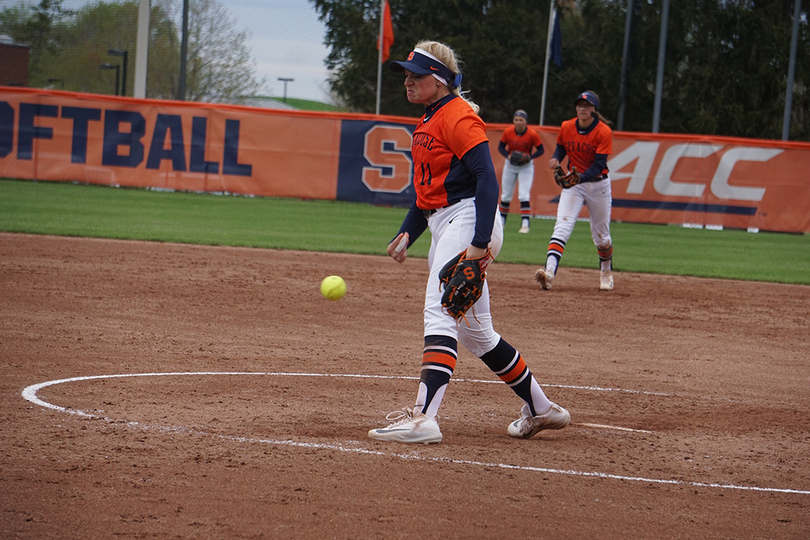Sydney O’Hara stays connected to softball through coaching

Sydney O'Hara once hit four homes runs in one game for Syracuse. Jordan Phelps | Staff Photographer
When Sydney O’Hara was in her junior year of high school at Cicero-North Syracuse High School, her English teacher, Brian Mingolelli, gave the class an assignment about their passions in life. He asked them to write about what they wanted to do with their careers and futures.
Immediately, O’Hara knew what she’d write about: coaching and teaching softball.
She’d play softball for four years at Syracuse after writing that essay, but her dream was always to mentor other players. After graduating in 2017, O’Hara began her coaching career at Le Moyne College, and she’s now in her first season as an assistant coach at Binghamton University.
“I knew that’s where I needed to be in life,” O’Hara said. “I needed to be around the sport. I could not live without being around the game.”
Tuesday afternoon, she’ll be coaching against her former team, including multiple players she played with just two years ago. As a player at SU, she was a third team All-American, tied the NCAA record for most home runs in a game (four) against North Carolina State and registered 13 saves, most in program history. O’Hara’s dream from that 11th grade class and throughout college has led to her pursuing the sport beyond her playing days.
“Having coaches who played and have been in our situations helps them understand what we’re going through and what we’re feeling,” SU senior and former teammate Hannah Dossett said.
After graduating from CNS, O’Hara was rejected from the SU School of Education and completed her freshman year undecided. She chose human development and family sciences as her major at the beginning of her sophomore year and added a minor in coaching by the end of that year.
During off-days from softball, O’Hara would trek back to CNS for her internship. As a part of her coursework, she attended CNS practices and provided pointers and tips to high schoolers. O’Hara helped manage the team’s schedule, assisted with technique in practice and occasionally attended games when her schedule permitted. In class, she studied the relationships between players and coaches, learned how to resolve conflicts and the best ways to communicate with different personality types.

Susie Teuscher | Digital Design Editor
After graduation, O’Hara applied for multiple assistant coaching jobs across the region. The first one she heard from was Le Moyne, and she became an assistant coach under then-head coach Jason Marino.
At Le Moyne, her primary role was scouting the future opponents and crafting a game plan at the plate. But the Dolphins had three different hitting coaches, who all had distinct approaches, O’Hara said. After just one season, Marino left, and O’Hara departed soon thereafter.
“It just wasn’t a fit for me. It’s kind of like being recruited to college,” O’Hara said. “You have to like where you are. I liked the players but it didn’t feel right to me at all and I decided to venture out. I wasn’t getting the full experience that I wanted to.”
O’Hara said she never wanted to go to a small school to play softball, and after one year with the Dolphins, she felt the same about coaching there. She sent out applications again to multiple other schools, including St. Joseph’s. That’s when Michelle Johnston, the head coach at Binghamton, called.
The two had spoken previously, when O’Hara was being recruited. Now, O’Hara was being recruited again, this time as a coach. She joined as an assistant coach with Jessica Bump, who hosted O’Hara for a campus tour back when Bump played second base for the Bearcats.
Now, O’Hara plans trips, schedules meals, game plans and works with the Binghamton pitchers to develop their mechanics.
“I try to teach them that movement is just as good as speed right now,” O’Hara said of her pitching philosophy. “Everyone says speed, speed, speed, but movement makes the difference.”
One day last fall, a Binghamton pitcher was out with an injury and O’Hara stepped in her place to throw a few simulated innings to prepare them for the spin they might see from opposing pitchers. She said she never tries to go easy when pitching, even as a coach.
In that drill, O’Hara struck out almost the entire team the first time around.
“At the end of the day, softball doesn’t define you as a person. I try to tell the girls that, and try to make them better as a person. Not a lot of girls will play softball beyond college. You’re going to have to get a job one day.”
For O’Hara, her job coaching softball is the best of both.





